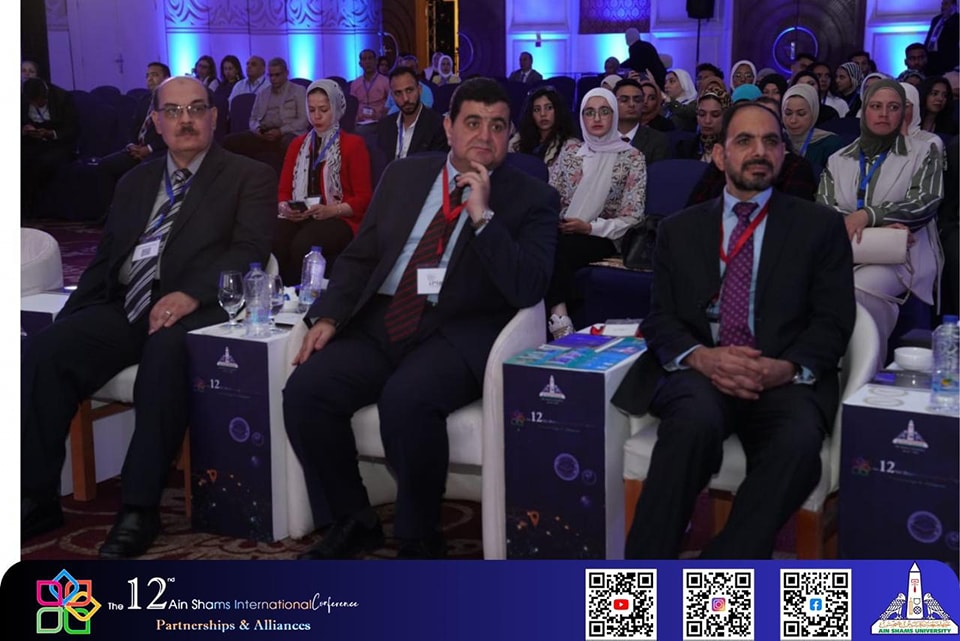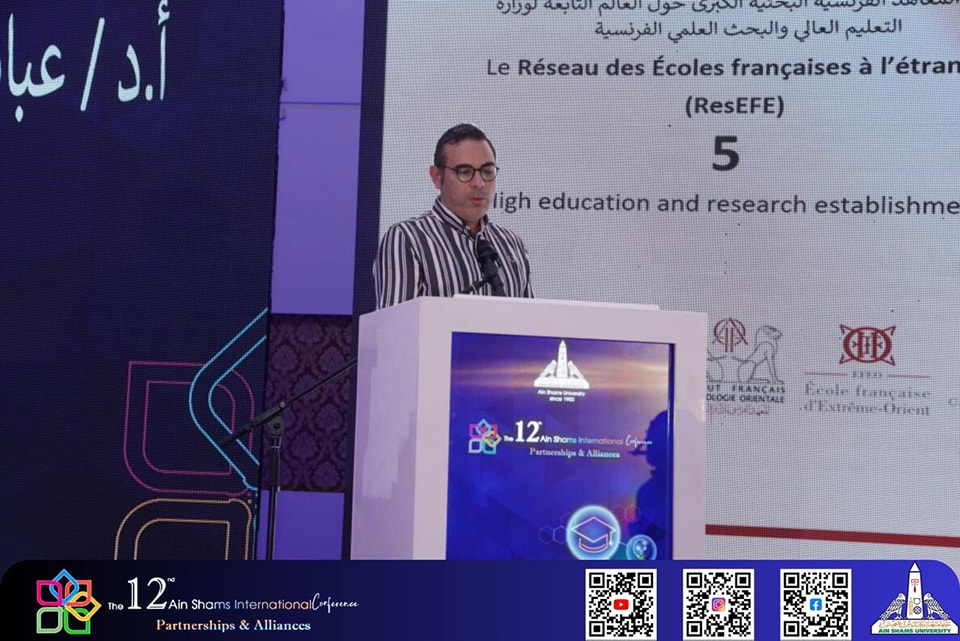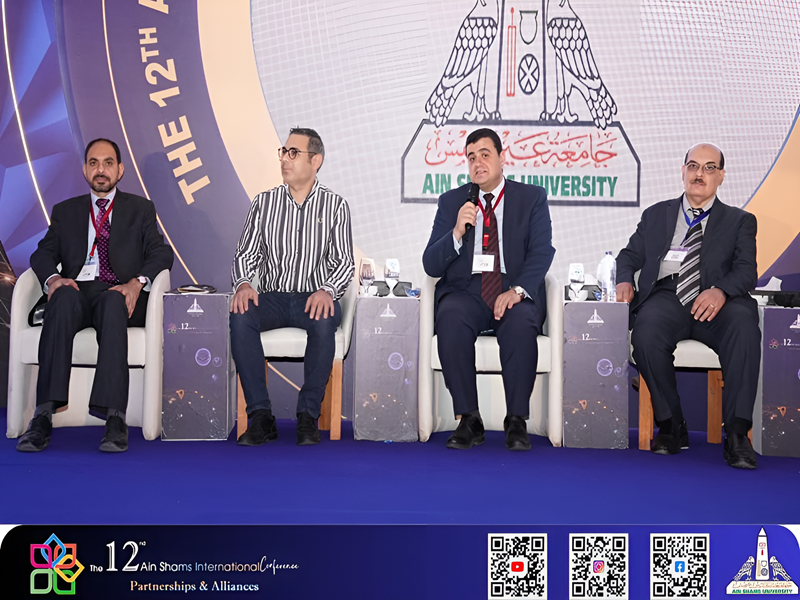Discussing “Impacts and Prospects of International Cooperation” within the activities of the 12th Ain Shams University Scientific Conference
Under the title “Impacts and Prospects of International Cooperation,” a session was held within the activities of the second day of the 12th Ain Shams University Scientific Conference, “Partnerships and Alliances” which is held under the patronage of Prof. Ayman Ashour, Minister of Higher Education and Scientific Research, Prof. Mohamed Diaa, President of Ain Shams University, and Prof. Ghada Farouk, Vice President of the University.
Partnerships in the field of archaeology were discussed, where a session was chaired by Prof. Ahmed Al-Shawki, Vice Dean of the Faculty of Archeology for Postgraduate Studies and Research.
 |
 |
During the session, Prof. Albrecht Vos, Department of Islamic Studies, Center for Near and Middle Eastern Studies, University of Marburg, reviewed via video conference the joint research projects and scientific partnerships between the University of Marburg and Ain Shams University, represented by the Faculty of Archeology, such as the research project “Enhancement”, which is a joint cooperation project between Ain Shams University, the German University of Marburg, the American University of Beirut, the University of Alexandria, the German Library for Middle Eastern Research at the University of Halle, the Gotha Research Library at the University of Erfurt, and the German Institute for Oriental Research, which is interested in documenting the cultural heritage of the Eastern Mediterranean.
As well as the Heritage in Cyberspace project, which depends on digitizing and preserving heritage and making it available to researchers and specialists, and through it, the Faculty of Archeology at Ain Shams University obtained a high-quality scanner dedicated to scanning files, maps, heritage books, and manuscripts.
On behalf of Prof. Abbas Zawash, Director of Studies at the French Institute of Oriental Archaeology, Eng. Amr Bahgat, Director of Communication and Media at the French Institute, talked about the partnership of the Faculty of Archeology with the French Institute of Oriental Antiquities, where he presented an introduction to the institute, which was established in 1880 and its field of interest in studying the history of Egypt through different eras. It is one of a network consisting of five French institutes spread around the world to study ancient antiquities.
He also touched on the institute's various partnerships, its departments, and the tasks it carries out, including training for Egyptian and foreign researchers, and joint grants with other institutes, noting that the institute allocates grants for Egyptian doctoral students for a period of one year, including what allows them to study in France.
He also discussed cooperation between Ain Shams University, where experts and researchers from the Faculty of Archeology participate in developing the institute’s research plans and preparing grants, in addition to holding joint training courses and workshops, joint excavation missions, and joint research projects, pointing out that there are currently more than thirty sites being excavated. It is carried out by teams working in partnership with various international universities, including Ain Shams University, and other research centers and academic institutes. The French Institute of Oriental Antiquities also funds about fifty scientific projects.
In his speech, Prof. Ahmed Al-Shawki, Vice Dean of the Faculty of Antiquities for Postgraduate Studies and Research on the excavations of Sheikh Al-Arab Hammam Castle, in cooperation between the Faculty of Archeology and the French Institute of Oriental Antiquities, pointing out that the excavations of Sheikh Al-Arab Hammam Castle in the village of Al-Arki in the Farshout Center of Qena Governorate are the product of fruitful cooperation between the French Institute of Oriental Antiquities in Cairo and the Ministry of Antiquities, and Faculty of Archeology, Ain Shams University.
He stressed that the character of Sheikh Al-Arab Hammam is a real historical figure that requires more and more studies from us, especially since Mount Al-Arki is one of the important archaeological sites of Egypt, especially in the prehistoric period.
During his speech, he reviewed the most important results of the excavations that began in 2020 at the site and are still ongoing, and the historical and archaeological importance of the site, as well as in the field of training inspectors of the Egyptian Ministry of Antiquities and students of the Faculty of Archeology at Ain Shams University.
The session's recommendations were as follows:
The need to sign cooperation agreements between various research bodies to facilitate the exchange of experiences and resources in the field of antiquities, excavations, restoration, preservation and maintenance, and to organize joint archaeological missions that include researchers and specialists from different countries to exchange knowledge and experiences.
Support and activate international treaties related to the protection of cultural heritage, such as the UNESCO Convention for the Protection of World Heritage, exchanging knowledge and enhancing cooperation between archaeological institutions inside and outside Egypt and between the Faculty of Archeology at Ain Shams University through the exchange of experiences, knowledge and modern techniques in the field of archaeology.
Emphasizing the establishment of joint research projects that bring together archaeologists from various countries and their counterparts in Egypt to enhance understanding of the common cultural heritage, in addition to organizing international workshops and conferences to exchange ideas and developments in the field of antiquities, and establishing advanced training programs for specialists in the field of restoration, preservation and maintenance, including Practical and theoretical training.
Cooperating with universities and academic institutes to develop graduate programs in the field of archaeology, excavations and restoration, developing advanced educational resources such as electronic courses and interactive training materials, and organizing field training programs for archaeology students and new specialists that include modern excavation techniques and safety procedures and providing opportunities for practical training at excavation sites in cooperation with Local and international archaeological institutions, while providing financial support and securing funding from governments, international organizations, and the private sector to support research projects in the field of archaeology.

.svg)
